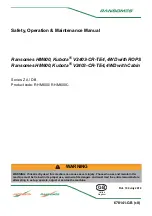
SECTION 2 - OPERATION
2-76
If
the
Operator
does
not
press
the
acknowledge/reset button during the pre--alarm
sequence, the EICS will progress to the full
critical alarm stage. The EICS will display a
constant “STOP” message in the upper portion
of the display and the lower portion will display
all symbols related to the rotary select switch.
The audible alarm will become a steady, solid
tone. If the automatic shutdown system is
enabled on the tractor, the engine will shut off
automatically. If the automatic shutdown system
is not enabled, the tractor will continue to run.
See “Automatic Shutdown Conversion” in the
Operator’s manual for information on how to
enable and disable this system. Pressing the
acknowledge/reset button will not clear the
display or audible alarm after the EICS has
reached the critical alarm stage.
ATTENTION: If the tractor electrical system is
not converted to the automatic shut down mode,
the engine will continue to run while not
receiving adequate amounts of lubrication.
Serious engine damage can result from running
the engine in this condition. It is imperative that
the low engine oil pressure condition be
investigated as soon as possible so as to avoid
serious engine damage
Whether the Operator chooses to stop the EICS
in the pre--alarm stage, or allow it to progress to
the critical alarm stage (not converted to
automatic shut down) the module on the engine
will be simultaneously reacting to the low engine
oil pressure signal it is receiving from its own
sending unit circuit.
NOTE: If the Operator allows the EICS to
progress to the critical alarm stage and has
the tractor converted to automatic shut
down, the engine will shut off without the
module causing a derate to the engine.
There will not be enough time for the module
to react from the pre--alarm sequence to the
critical alarm sequence and shut down.
The module will sense the low oil pressure
condition and begin an engine speed/engine
power derate. The module will lower the engine
rpm to a preset level (1400 rpm) allowing no
acceleration of the engine above that level AND
lower the horsepower output of the engine a
preset amount (20% of gross horsepower) as
long as the low engine oil pressure condition
exists.
Both the speed and engine power derate will be
gradual and simultaneous. Elapsed time of the
speed and power derate from maximum
horsepower and 2100 engine rpm to the 1400
rpm and 20% reduced horsepower output level
will
be
approximately
25
seconds
(approximately 40 rpm/second, and 1%
horsepower/second). This reduced speed and
power output mode will allow the Operator to
move the tractor from an undesirable location
and make repairs.
The Operator cannot cancel or interrupt the
derate sequence from occurring on the engine.
The module does not recognize activation of,
nor is it tied into the EICS acknowledge/reset
button on the dash of the tractor.
If the tractor is shut down and then restarted,
and the alarm condition still exists, (low engine
oil pressure) the EICS and module will repeat
the alarm and derate sequence. If the tractor is
restarted and the alarm condition has been
corrected, the tractor will return to normal
operation. If the tractor is not shut down, and the
alarm condition is corrected, the tractor will
return to normal operation without having to
shut it off and restart it.
Summary of Contents for Versatile 2290
Page 1: ......
Page 20: ...0 18 ...
Page 58: ...SECTION 1 GENERAL INFORMATION 1 38 ...
Page 66: ......
Page 160: ......
Page 162: ......
Page 164: ......
Page 165: ......
Page 166: ......
Page 167: ......
Page 182: ......
Page 183: ...SECTION 2 OPERATION 2 125 Figure 2 163 ...
Page 232: ...SECTION 3 LUBRICATION AND MAINTENANCE 3 7 BLANK PAGE ...
Page 233: ......
Page 234: ......
Page 236: ......
Page 266: ......
Page 274: ......
Page 316: ...SECTION 4 TROUBLESHOOTING 4 2 BLANK PAGE ...
Page 330: ...SECTION 4 TROUBLESHOOTING 4 16 BLANK PAGE ...
Page 363: ...SECTION 5 SPECIFICATIONS 5 33 BLANK PAGE ...
Page 370: ...5 40 ...
Page 372: ...5 42 ...
Page 380: ......
















































